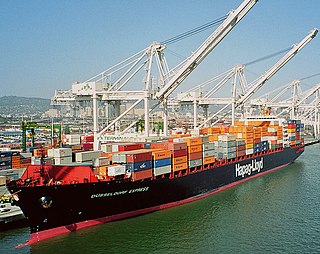
Hapag-Lloyd AG is a German international shipping and container transportation company, the 5th biggest in the world. It was formed in 1970 through a merger of Hamburg-American Line (HAPAG) and Norddeutscher Lloyd.

Marika Rökk was a German-Austrian dancer, singer and actress of Hungarian descent who gained prominence in German films in the Nazi era. She resumed her career in 1947 and was one of Europe's most famous operetta singers, performing onstage until 1986.
UFA GmbH, shortened to UFA, is a film and television production company that unites all production activities of the media conglomerate Bertelsmann in Germany. The original UFA was established as Universum-Film Aktiengesellschaft on December 18, 1917, as a direct response to foreign competition in film and propaganda. UFA was founded by a consortium headed by Emil Georg von Stauß, a former Deutsche Bank board member. In March 1927, Alfred Hugenberg, an influential German media entrepreneur and later Minister of the Economy and Minister of Agriculture and Nutrition in Adolf Hitler's cabinet, purchased UFA and transferred ownership of it to the Nazi Party in 1933.
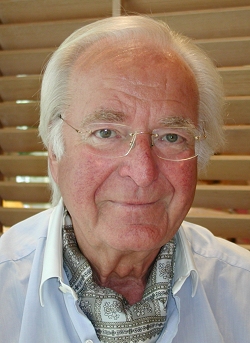
Martin Böttcher was a German composer, arranger and conductor.
Norddeutscher Lloyd was a German shipping company. It was founded by Hermann Henrich Meier and Eduard Crüsemann in Bremen on 20 February 1857. It developed into one of the most important German shipping companies of the late 19th and early 20th centuries, and was instrumental in the economic development of Bremen and Bremerhaven. On 1 September 1970, the company merged with Hamburg America Line (HAPAG) to form Hapag-Lloyd AG.

The Port of Hamburg is a seaport on the river Elbe in Hamburg, Germany, 110 kilometres (68 mi) from its mouth on the North Sea.

Walter Ruttmann was a German cinematographer and film director, an important German abstract experimental film maker, along with Hans Richter, Viking Eggeling and Oskar Fischinger. He is best known for directing the semi-documentary 'city symphony' silent film, with orchestral score by Edmund Meisel, in 1927, Berlin: Symphony of a Metropolis. His audio montage Wochenende (Weekend) (1930) is considered a major contribution in the development of audio plays.

Babelsberg Film Studio, located in Potsdam-Babelsberg outside Berlin, Germany, is the oldest large-scale film studio in the world, producing films since 1912. With a total area of about 460,000 square metres (5,000,000 sq ft) and a studio area of about 25,000 square metres (270,000 sq ft) it is one of Europe's large film studios.
The Tri-Ergon sound-on-film system was developed from around 1919 by three German inventors, Josef Engl (1893–1942), Joseph Massolle (1889–1957), and Hans Vogt (1890–1979).

Deutsche Werft was a shipbuilding company in Finkenwerder Rüschpark, Hamburg, Germany. It was founded in 1918 by Albert Ballin and with Gutehoffnungshütte (GHH), Allgemeine Elektricitäts-Gesellschaft (AEG) and Hamburg Amerikanische Packetfahrt Actien Gesellschaft (HAPAG) as investors.

Erich Pommer was a German-born film producer and executive. Pommer was perhaps the most powerful person in the German and European film industries in the 1920s and early 1930s.

Sascha-Film, in full Sascha-Filmindustrie AG and from 1933 Tobis-Sascha-Filmindustrie AG, was the largest Austrian film production company of the silent film and early sound film period.
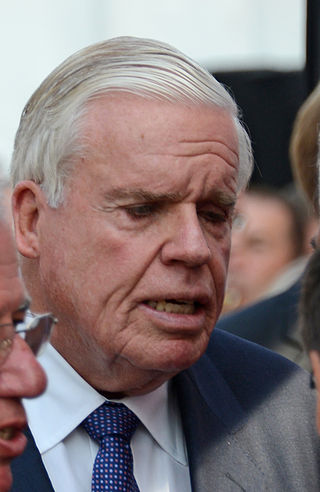
Klaus-Michael Kühne is a German billionaire businessman. In October 2021, the Bloomberg Billionaires Index estimated Kühne's net worth to be US$36.2 billion, making him the richest person in Germany. He is the honorary chairman and majority owner (53.3%) of the international transport company Kühne + Nagel, co-founded by his grandfather, August Kühne (1855–1932).

The Reichs-Rundfunk-Gesellschaft was a national network of German regional public radio and television broadcasting companies active from 1925 until 1945. RRG's broadcasts were receivable in all parts of Germany and were used extensively for Nazi propaganda after 1933.
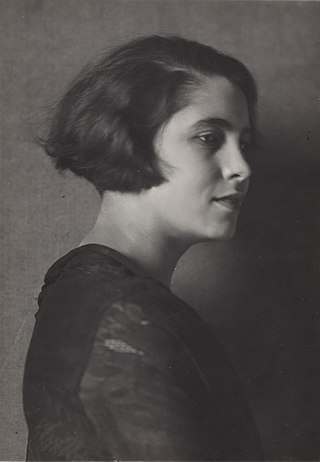
Carola Neher was a German actress and singer.
Bastian Clevé, is a German filmmaker and producer. He is Professor and Head of the Film Production-Department at the Film Academy Baden-Wuerttemberg in Ludwigsburg, Germany.
Hamburger Hafen und Logistik AG, known until 2005 as Hamburger Hafen- und Lagerhaus-Aktiengesellschaft, and prior to that as Hamburger Freihafen-Lagerhaus Gesellschaft (HFLG) since 1885, is a German logistics and transportation company specialising in port throughput and container and transport logistics.
Wolfgang Zeller was a German composer noted for his complex film music.
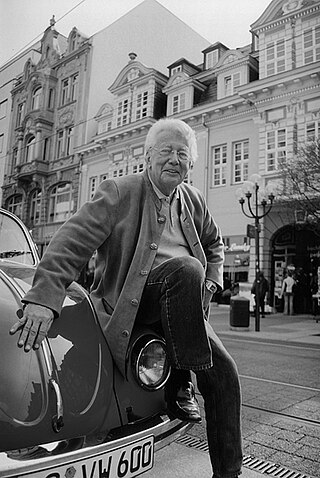
Dieter Thomas Heck was a German television presenter, singer and actor. He is known as the presenter of the popular TV program ZDF-Hitparade, featuring German Schlager music, from 1969 to 1984, reaching millions of people. As an actor, he starred in the TV play Das Millionenspiel in 1970.
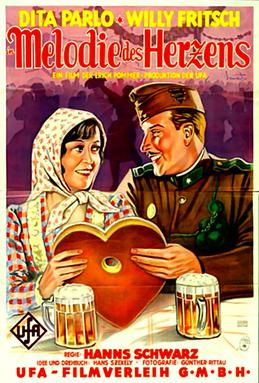
Melody of the Heart is a 1929 German musical film directed by Hanns Schwarz and starring Dita Parlo, Willy Fritsch and Gerő Mály.














